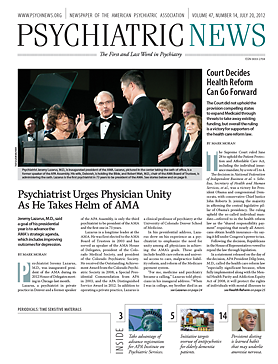The Supreme Court ruled June 28 to uphold the Patient Protection and Affordable Care Act, including the individual insurance mandate, by a vote of 5 to 4.
The decision in National Federation of Independent Business et al. v. Sebelius, Secretary of Health and Human Services, et al., was a victory for President Obama and congressional Democrats, with conservative Chief Justice John Roberts Jr. joining the majority in affirming the central legislative pillar of Obama’s presidency. The ruling upheld the so-called individual mandate—referred to in the health reform law as the “shared responsibility payment” requiring that nearly all Americans obtain health insurance—by saying it fell under Congress’s power to tax.
Following the decision, Republicans in the House of Representatives vowed to repeal the law through legislation.
In a statement released on the day of the decision, APA President Dilip Jeste, M.D., called the health care reform law “especially significant because, when fully implemented along with the Mental Health Parity and Addiction Equity Act of 2008, it will protect the rights of individuals with mental illnesses to have access to appropriate care.”
Jeste added, “The American Psychiatric Association is committed to working to ensure that health insurance coverage and access to mental health care are available for all individuals with mental health needs (including intellectual developmental disorders and substance use disorders). The financial and human cost of untreated mental illness is enormous, and much work remains to ensure adequate mental health coverage and access to care. APA will continue to work with members, allied health organizations, and others to advocate for patients and physicians.”
Psychiatrist Jeremy Lazarus, M.D., the new AMA president (see Psychiatrist Urges Physician Unity as He Takes Helm of AMA), said the AMA is pleased that the court’s decision “means millions of Americans can look forward to the coverage they need to get healthy and stay healthy.”
Lazarus added, “The American Medical Association has long supported health insurance coverage for all and … remains committed to working on behalf of America’s physicians and patients to ensure the law continues to be implemented in ways that support and incentivize better health outcomes and improve the nation’s health care system.”
Regarding the individual mandate, the Court did not agree with the Obama administration that it fell within Congress’s power to regulate commerce, but the Court did agree with the administration’s supporting argument that the mandate—which is referred to in the law as the “shared responsibility payment”— may be considered a tax and falls within the congressional power to levy taxation.
“[T]he shared responsibility payment may for constitutional purposes be considered a tax,” the Court ruled. “The payment is not so high that there is really no choice but to buy health insurance; the payment is not limited to willful violations, as penalties for unlawful acts often are; and the payment is collected solely by the IRS through the normal means of taxation. None of this is to say that payment is not intended to induce the purchase of health insurance. But the mandate need not be read to declare that failing to do so is unlawful. Neither the Affordable Care Act nor any other law attaches negative legal consequences to not buying health insurance, beyond requiring a payment to the IRS. And Congress’s choice of language—stating that individuals ‘shall’ obtain insurance or pay a ‘penalty’— does not require reading [the health law] as punishing unlawful conduct.”
One facet of the law that the Court did not uphold is giving the federal government the power to penalize states that choose not to participate in the Medicaid expansion by taking away their existing Medicaid funding. “The threatened loss of over 10 percent of a state’s overall budget is economic dragooning that leaves the states with no real option but to acquiesce in the Medicaid expansion,” the Court ruled. “The original program was designed to cover medical services for particular categories of vulnerable individuals. Under the Affordable Care Act, Medicaid is transformed into a program to meet the health care needs of the entire nonelderly population with income below 133 percent of the poverty level. A state could hardly anticipate that Congress’s reservation of the right to ‘alter’ or ‘amend’ the Medicaid program included the power to transform it so dramatically. The Medicaid expansion thus violates the Constitution by threatening states with the loss of their existing Medicaid.”
But overall the decision is a victory for supporters of the health care reform law and means that most of its far-reaching changes will roll forward.
Lazarus said that the decision protects important improvements, such as ending coverage denials due to preexisting conditions and lifetime caps on insurance, and allowing the 2.5 million young adults up to age 26 who gained coverage under the law to stay on their parents’ health insurance policies. “The expanded health care coverage upheld by the Supreme Court will allow patients to see their doctors earlier rather than waiting for treatment until they are sicker and care is more expensive,” Lazarus said. “The decision upholds funding for important research on the effectiveness of drugs and treatments and protects expanded coverage for prevention and wellness care, which has already benefited about 54 million Americans.”
He added that the law simplifies administrative burdens, including streamlining insurance claims. “These important changes have been made while maintaining our American system with both private and public insurers,” Lazarus said.

